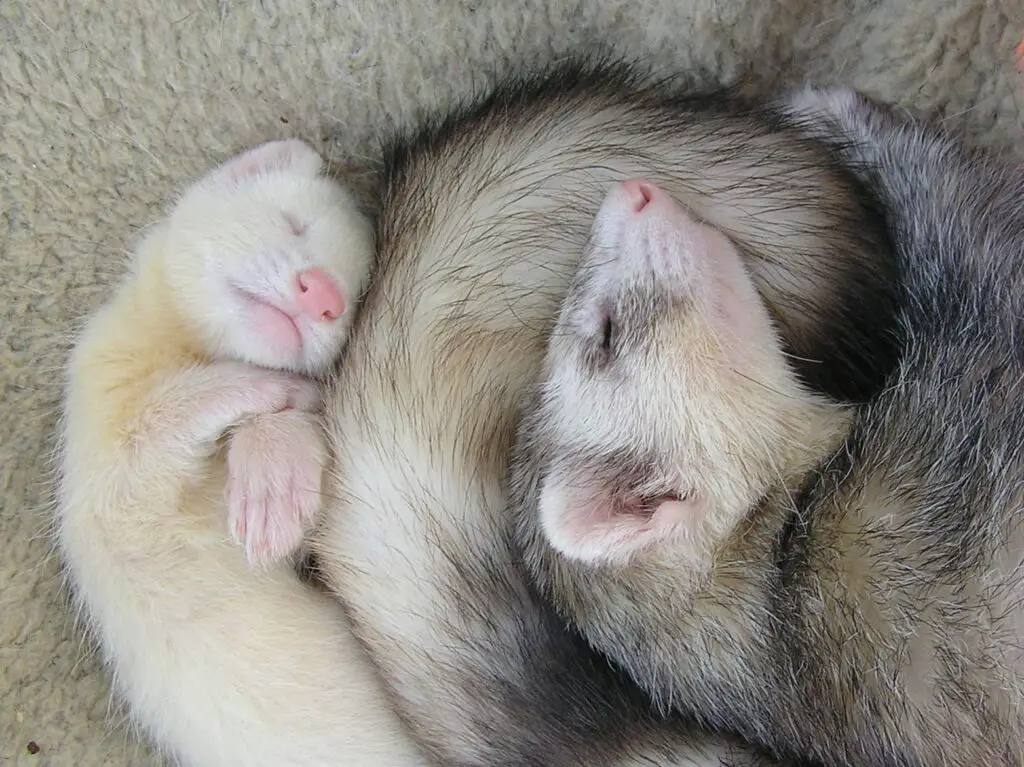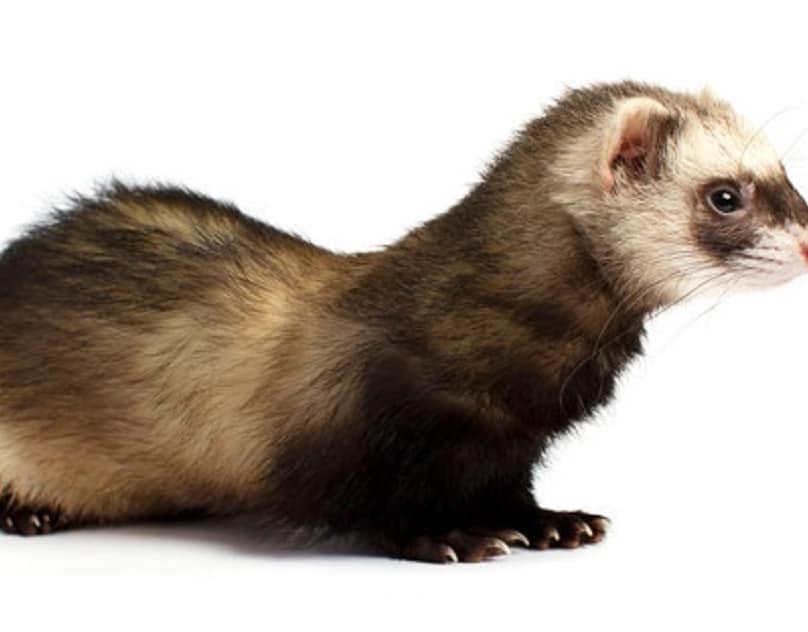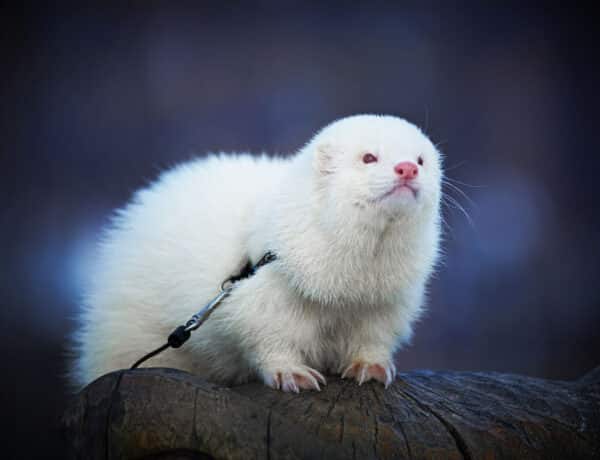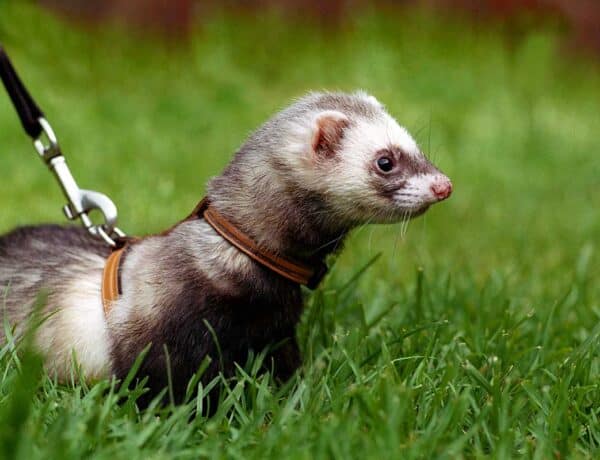Introduction
How To Fatten Up A Ferret: Ferrets are delightful and curious little creatures that have captured the hearts of many pet enthusiasts. These intelligent and playful animals require proper care and attention to ensure they lead healthy and happy lives. One aspect of ferret care that often raises questions among ferret owners is a healthy weight or, in some cases, how to fatten up a ferret that may be underweight. Whether you’ve recently adopted a skinny ferret or simply want to ensure your furry friend stays in optimal condition, understanding the nuances of their diet, health, and lifestyle is crucial. The essential steps and considerations to help you safely and effectively fatten up a ferret, ensuring their well-being and longevity.
Ferrets are delightful and curious little creatures that have captured the hearts of many pet enthusiasts. These intelligent and playful animals require proper care and attention to ensure they lead healthy and happy lives. One aspect of ferrets drink care that often raises questions among ferret owners is how to maintain a healthy weight or, in some cases, how to fatten up a ferret that may be underweight. Ferrets, being obligate carnivores, have unique dietary and health needs that can be challenging to meet, especially if they are not eating enough or have experienced illness.
Whether you’ve recently adopted a skinny ferret, are caring for a sick one, or simply want to ensure your furry friend stays in optimal condition, understanding the nuances of their diet, health, and lifestyle is crucial. The essential steps and considerations to help you safely and effectively fatten up a ferret, ensuring their well-being and longevity. From selecting the right foods to addressing potential health issues and creating a comfortable living environment, you’ll find all the information you need to provide your ferret with the best possible care and help them thrive. Your ferret’s well-being is our priority, and by following these guidelines, you can ensure they lead a happy, healthy, and well-rounded life.

What do you feed a ferret to gain weight?
Raw meat is the best option, including whole prey. Ferrets can also eat kitten food, as it has a high meat protein content, baby food that’s high in meat protein, and dried ferret food, that’s high in meat protein. As an occasional treat, your ferret can also eat eggs.
High-Quality Ferret Food: Commercial ferret food is readily available and formulated to meet the nutritional needs of ferrets. Look for brands that have animal-based proteins listed as the primary ingredients, such as chicken, turkey, or lamb meal. Avoid foods with excessive fillers like corn or grains, as these can lead to obesity without providing essential nutrients.
Supplement with Meat: To increase protein intake, supplement your ferret’s diet with high-quality, lean meats. These can include raw or cooked chicken, turkey, or beef. Ensure the meat is boneless and free from seasoning, sauces, or spices.
Kitten Food: High-quality kitten food can also be beneficial for underweight ferrets because it is richer in calories and protein than regular ferret food. Look for kitten food with meat as the primary ingredient and avoid those with excessive carbohydrates.
Ferret-Safe Fruits and Vegetables: While ferrets are primarily carnivores, they can occasionally have small amounts of fruits and vegetables as treats. These can provide some variety in their diet and encourage eating. Examples include small pieces of banana, apple, or cooked sweet potatoes.
How fast do ferrets gain weight?
Here we provide a normative weight dataset for the healthy female ferret and demonstrate that ferrets show predictable and stereotypical seasonal fluctuations in weight, with most animals gaining around 0.89% of their average body weight per week in winter and losing around 0.65% of their weight per week in summer.
Age and Growth Stage: Young ferrets, especially kits (baby ferrets), tend to gain weight more rapidly than adults. Kits typically grow quickly in their first few months of life. However, the rate of growth starts to slow down as they reach adulthood, usually at around six months of age.
Health Condition: The speed of weight gain in a ferret can be influenced by its current health status. Illnesses, parasites, or other medical issues can affect a ferret’s appetite and metabolism, leading to weight loss. Addressing and treating any underlying health problems is crucial before focusing on weight gain.
Diet and Nutrition: The type of diet and nutrition a ferret receives plays a significant role in how fast they gain weight. Providing a well-balanced diet rich in animal-based protein and fat is essential for healthy weight gain. Ferrets may gain weight more quickly when given high-calorie, high-protein foods, but it’s important to avoid excessive fat intake, which can lead to obesity.
Exercise: Regular exercise is vital for maintaining a healthy weight in ferrets. An active ferret is more likely to have a better metabolism and muscle mass, which can contribute to healthy weight gain. Encourage play and exploration to keep your ferret active.
Can ferrets eat chicken?
Ferrets love both cooked and raw meat, in particular rabbit, poultry and mice. Raw meat should be given fresh and don’t worry about the bones, ferrets can eat bones and they are a great source of calcium, marrowbone and minerals.
Boneless and Skinless: When offering chicken to your ferret, make sure it is boneless and skinless. Bones can be a choking hazard, and the skin is high in fat, which can lead to obesity if consumed in excess.
Cooked and Unseasoned: It’s crucial to cook the chicken thoroughly before feeding it to your ferret. Raw chicken can carry harmful bacteria that may be dangerous for both your ferret and you. Ensure that the chicken is plain, without any seasonings, sauces, or spices. Steaming or boiling is a good cooking method to retain the chicken’s nutritional value.
Small, Bite-Sized Pieces: Cut the cooked chicken into small, bite-sized pieces that are easy for your ferret to eat. This can help prevent choking and make it more manageable for your ferret to consume.
Variety and Moderation: While chicken can be a part of your ferret’s diet, it should not be the sole protein source. Offering a variety of meats, such as turkey, beef, or even organ meats like liver, can provide a well-rounded diet. Balance is key to meeting your ferret’s nutritional needs.
Monitor for Allergies or Sensitivities: Like humans, some ferrets may have food allergies or sensitivities. Watch for any signs of digestive upset, skin issues, or changes in behavior after introducing chicken or any other new food to their diet. If you notice any adverse reactions, consult your veterinarian for guidance.
What to do if ferret is not eating?
Ferrets are very small and don’t have large energy reserves in their body, so they can quickly become tired and weak if they stop eating. Offer them a variety of tempting foods, especially their favourite! If this doesn’t tempt them to eat then the only option will be to syringe feed them.
Immediate Veterinary Attention: The first and most crucial step is to consult a veterinarian experienced in ferret care. A sudden loss of appetite in a ferret can be a sign of an underlying health issue, and a vet can perform a thorough examination to identify and address the problem.
Observe for Other Symptoms: Along with loss of appetite, keep an eye out for any other symptoms or changes in behavior, such as lethargy, diarrhea, vomiting, difficulty breathing, or changes in stool or urine. These can provide valuable information to the vet for diagnosis.
Keep the Ferret Hydrated: Encourage your ferret to drink water, as dehydration can exacerbate the problem. Offer fresh, clean water in a shallow dish or a water bottle that is easily accessible. You can also try offering electrolyte solutions designed for ferrets to help maintain their hydration.
Adjust Diet Appropriately: If your ferret has specific dietary needs due to a medical condition or is recovering from an illness, follow your vet’s dietary recommendations closely. They may suggest specific foods or supplements to aid in recovery.
How much do ferrets eat per day?
The average ferret will eat 5-7% of its body weight on a daily basis. This is about 50-75 grams of food for a ferret weighing 1 kg. However, the quantity of food differs from animal to animal and according to life stage. Ferrets will require larger quantities during growth, gestation and reproduction.
Age: Young ferrets (kits) have higher energy requirements and tend to eat more than adult ferrets. Kits typically require more frequent feedings and may eat up to 8 ounces (227 grams) of food per day during their growth phase. As they mature, their food intake will decrease.
Activity Level: Active and playful ferrets may need slightly more food to fuel their energy expenditure. Ferrets are naturally curious and enjoy exploring their surroundings, which can be physically demanding.
Metabolism: Individual ferrets may have variations in their metabolism, leading to differences in their daily food requirements. Some ferrets naturally have a higher metabolic rate and may need more food to maintain their weight.
Diet Quality: The quality of the food you provide plays a significant role in determining how much your ferret needs to eat. High-quality ferret food is rich in animal-based proteins and fats, which are essential for their health. Low-quality or inappropriate foods may require larger quantities to meet their nutritional needs.
Is turmeric good for ferrets?
You can use turmeric for your small pet as anti-cancer support due to its antioxidant properties. Use of turmeric extracts in a pets daily diet may help scavenge free radicals, increase antioxidant enzymes, and inhibit lipid peroxidation.
Digestive Sensitivity: Ferrets have sensitive digestive systems, and introducing new foods or supplements, especially in large quantities, can lead to gastrointestinal upset. Turmeric, when given in excess or without proper precautions, may cause digestive issues in ferrets, including diarrhea.
Lack of Scientific Research: There is a lack of scientific research specifically addressing the effects of turmeric on ferrets. While some studies suggest potential health benefits of curcumin in humans and other animals, it’s essential to remember that ferrets have unique dietary and metabolic needs.
Consult a Veterinarian: Before considering the use of turmeric or any other supplements in your ferret’s diet, consult with a veterinarian experienced in ferret care. They can provide guidance on whether turmeric is appropriate for your ferret’s specific health condition and recommend safe dosages if necessary.
Potential for Allergies or Sensitivities: Just like with any new food or supplement, some ferrets may have allergies or sensitivities to turmeric. Watch for any signs of adverse reactions, such as changes in behavior, skin issues, or digestive problems, if you decide to introduce turmeric to their diet.
Are egg yolks good for ferrets?
You can feed your ferret whole eggs or just the yolks, depending on your preference or what you have available. You’ll want to avoid feeding them just egg whites because there is a risk of causing a biotin deficiency in your fuzzy. Egg yolks are rich in biotin, but egg whites contain a protein called avidin.
High-Quality Protein: Egg yolks are rich in high-quality protein, which is essential for a ferret’s overall health. The protein in eggs is easily digestible and can contribute to your ferret’s muscle development and overall energy levels.
Healthy Fats: Egg yolks also contain healthy fats, including omega-3 fatty acids, which can help maintain a ferret’s skin and coat health. However, remember that ferrets have specific fat requirements, and while eggs can contribute, they should not replace their primary protein source.
Moderation: While egg yolks can be beneficial, they should be offered in moderation as part of a balanced diet. Too many egg yolks can lead to an excessive intake of fat, which can contribute to obesity in ferrets.
Cooked Eggs: It’s essential to provide egg yolks in a cooked form to reduce the risk of bacterial contamination. Raw eggs may carry harmful bacteria, which can be particularly dangerous for ferrets with their sensitive digestive systems.
Is baby food OK for ferrets?
It is important for ferrets to take in nutrients when they are sick to avoid additional complications. A popular choice is baby food. Remember that ferrets need a meat-based diet, and choose a baby food accordingly. Serve the food barely warm using fingers, a spoon, or syringe.
Nutritional Content: Baby food is formulated for human infants and is often designed to be easy to digest and low in fat. It lacks many of the essential nutrients that ferrets require for their health, such as taurine, which is crucial for their heart and eye health.
High Sugar Content: Some baby foods contain added sugars, which can be harmful to ferrets. Ferrets have a low tolerance for carbohydrates and should have a diet that is low in sugar to prevent health issues such as insulinoma, a common ferret disease.
Limited Protein: Baby food may not provide enough high-quality animal-based protein for ferrets, which is essential for their muscle development, energy, and overall well-being.
Possible Additives: Some baby foods may contain additives, fillers, or preservatives that are not suitable for ferrets and may cause digestive upset or other health problems.

Conclusion
Caring for a ferret, whether you’re trying to help them gain weight or simply maintain their health, is a rewarding journey that requires patience, knowledge, and dedication. Ensuring your ferret is at a healthy weight not only promotes their physical well-being but also contributes to their overall happiness and longevity. A range of essential factors, from diet and nutrition to exercise and veterinary care, all aimed at helping you ferret fatten up a ferret safely and responsibly. It’s important to remember that every ferret is unique, and what works for one may not work for another. Therefore, constant monitoring and adaptation to your ferret’s specific needs are vital.
By providing your ferret with high-quality, protein-rich foods, regular exercise, and a loving environment, you can greatly improve their chances of reaching and maintaining a healthy weight. Always consult with a veterinarian for professional guidance and advice tailored to your ferret’s individual requirements. The goal of fattening up a ferret is not just about the numbers on the scale; it’s about ensuring they enjoy a fulfilling and vibrant life by your side. With the right care and attention, your ferret can thrive, bringing joy and companionship to your home for years to come.
To fatten up a ferret may have its challenges, but the bond you forge with your furry friend through this process is immeasurable. As you observe them grow healthier, more energetic, and content, you’ll experience the rewarding feeling of knowing you’ve provided them with the best possible life. A well-fed and contented ferret is a happy ferret, and the joy they bring to your life is immeasurable. Cherish each moment with your furry companion, and continue to provide them with the care and attention they deserve. Your ferret’s well-being is a testament to your love and commitment to their happiness, and together, you’ll share many wonderful adventures and unforgettable moments.





No Comments